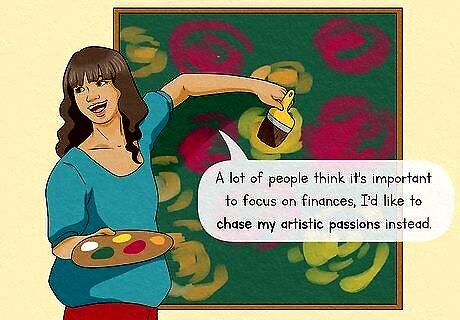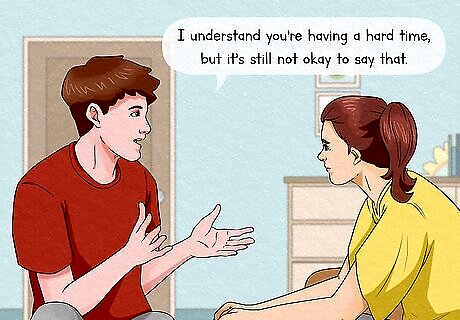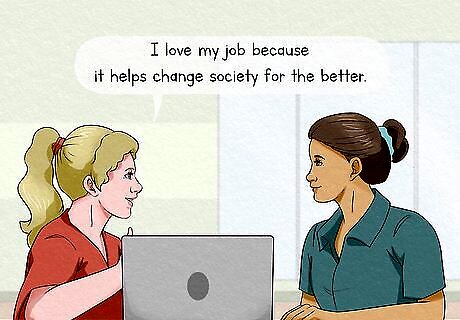
views
- To cultivate rareness, all you have to do is remain authentic.
- Uplift others and you’ll truly stand out.
- Impress others by staying humble.
- Stay calm under pressure to show off your incredible resilience.
Have integrity.

Stand out in the crowd by always sticking to your principles. Whenever you have a chance, show others that your actions line up with your morals. Share the values that define you, then think about behaviors that match your intentions. For example, if you say that you believe in cooperation, find every chance you can to support people. Everyone will be wowed by all your consistency. Integrity based on morals: “I believe in helping the needy, so I volunteer at a shelter.” Integrity based on values: “I value honesty, so I’ll give you my unfiltered take here.” Integrity based on intentions: “I wanted to show I cared, so I donated to the fundraiser.”
Stay humble.

Be modest by embracing both strengths and weaknesses. Tell your friends or peers any areas of growth you're working on, like time management or organization. If people compliment you, thank them, then smile and say that you're working just as hard as everyone else is. Being humble about a strength: "Thank you! I really appreciate that. I try my best to present the best research I can, and it definitely takes a lot of work." Being humble about an area of growth: "That's very nice of you to say. While I love to express my creativity, I struggle to focus on boring life stuff...like taxes!" Being humble about being part of a team: "You're too kind! I know that this campaign was a hit because of each and every person here."
Remain authentic.

Share what’s in your heart to show you’re genuine. Speak about your outlooks and be totally truthful. Even when you'll be "different" from the rest of the pack, say exactly what's on your mind. Strike the right balance between honesty and respect when you open up—outline all your opinions and share your perspective. Just be sure to be courteous every time. Authenticity about a different opinion: "While a lot of people think it's important to focus on finances, I’d like to chase my artistic passions instead." Authenticity about a unique perspective: "I think it’s okay to goof off at work sometimes and experiment with different ideas! It helps keep things fresh and creative." Authenticity about your true feelings: "I think we should avoid creating any ads that make people insecure. Let's produce positive content instead!"
Show kindness.

Express compassion at every moment to uplift everyone. Pay attention when people ask for help and share how you'd like to pitch in. After you've volunteered and see the positive impact you’ve made on people’s lives, you'll be sure that your actions really mattered. Support peers and co-workers by sharing tips and resources. Assist charities, shelters, and non-profits. Do simple favors for friends and strangers. Tell your friends they can reach out at any time for help.
Prove you’re trustworthy.

Keep secrets and promises to be a great confidante. Speak highly of others, listen closely to what others have to say, and steer clear of gossip—others come to you when they need to share sensitive info. Because you're so reliable, they'll know you have their best interests at heart. Avoiding gossip: “I only want to speak highly of others I work with.” Staying discreet: “Thank you for sharing. I will keep the details private.” Keeping a promise: “I reported the incident, but I kept your name out of it.”
Stay honest.

Be sincere and you’ll definitely confirm that you tell the truth. Take every opportunity you can to be open and transparent. When you're vulnerable or struggling, let people know. If you can’t show up for an individual, it’s okay to say that. The more you're straightforward even when the situation isn't ideal, the more others will be impressed by your candidness. Honesty about vulnerability: "This is really new to me, and I'm not sure I have the hang of it yet." Honesty about low bandwidth: "I would love to attend, but I'm swamped with projects right now!" Honesty about a negative situation: "I'm facing hardships in my family, and it's really impacted me."
Demonstrate courage.

Fight for what you believe in to show your bravery. If you or other people are mistreated, express your boundaries. Even if it’s easier to “keep the peace” and let an unkind remark or action slide, step up and speak up. For example, if someone lashes out—even if they’re tired or stressed—let them know that their behavior isn’t acceptable. Witnesses will notice your assertiveness and be inspired to show bravery, too. State a boundary: “I will not respond to name-calling.” Use courage and empathy: “I understand you’re having a hard time, but it’s still not okay to say that.” Stand up for others: “I have to step in here—Jamie doesn’t deserve to be treated like that.”
Prioritize empathy.

Listen to everyone’s experiences to demonstrate that you care. Make time to listen to other people. Ask about how they’re doing right now and learn about what they've gone through in the past.Then, explain how you would feel if you were in similar situations. Your empathy will be extremely meaningful to them. Express emotional empathy by sharing similar feelings: Example: "If someone said that to me, I would be hurt, too." Show cognitive empathy when you haven't had the same experiences: Example: "After you broke down that interaction and shared how it impacted you, I can completely understand why that was an uncomfortable dynamic."
Value other people.

Put community first to make others feel appreciated. When people ask what matters most to you, talk about how others enhance your life and the way their ideals motivate you. For example, instead of talking about money, gush about how you love your job because it helps change society for the better. Your selflessness will warm people's hearts. Share how the insight of others is more valuable than profit. Express how collaboration and teamwork fulfills you. Discuss why you cherish building friendships and connections. Say that creating a sense of family and community is important to you.
Give praise.

Hand out compliments and you’ll be the highlight of everyone’s day. Look for ways that people are shining or excelling. These moments can be understated, like the way someone always has a smile on their face, or attention-grabbing, such as an incredible sales tactic that a co-worker discovered. When you give everyone sincere words of affirmation, you'll boost their self-esteem and their opinion of you. Prioritize giving praise that's based on someone's personality rather than their appearance or the way others can benefit from them. Example: "Your strategy about speaking to the customer like they're your friend was incredible! You are clearly a very sensitive, creative, and thoughtful person."
Communicate with calmness.

Be polite during every interaction to show respect. No matter what situation you find yourself in, maintain your composure. Choose to be as friendly and courteous as possible. For example, call people by their first name and say that you value them even when you have disagreements. You'll defuse conflict and find common ground. When you speak mindfully in high-pressure situations, people will look up to you as a leader. If you check in about people’s needs and validate their feelings, you’ll resolve conflicts more easily. Every time you model grace, manners, and peacefulness, you’ll be an example of how to act in difficult scenarios.
Exercise patience.

Keep your cool to prove you can do well under pressure. When you are faced with either minor inconveniences or major crises, tap into your optimism and resilience. If you confront difficulties, slow down and put everything in perspective by reminding yourself that all obstacles are temporary—when anyone sees you take a moment to pause or reflect, they’ll probably be impressed by your peaceful outlook. Smile, take deep breaths, and use affirmations. Your calm body language and de-stressing tactics will encourage others to take care of themselves, too. Example Affirmation: "Even though it’s hard to concentrate at work with all the construction work happening outside, it’ll be over soon. The contractors said they’ll be done in 10 minutes."
Take accountability for your actions.

Admit your mistakes to say you always want to make things right. If you slipped up or were incorrect, avoid blaming others and own up to your behavior as soon as you can. Be sincerely apologetic and express that you had the best intentions and that you'll strive to do better in the future. Share that you understand where you went wrong. When you're willing to say when you're at fault, others will appreciate how credible and well-intentioned you are. Example of a slip-up: "I forgot to add an attachment to that e-mail!" Example of an incorrect remark: "I didn't repeat that statement correctly." Example of owning up to behavior: "I admit that I can forget small details." Example of striving to do better: "I will study all of our guidelines."
Express forgiveness.

Show mercy by letting go and moving on. When someone says they're sorry for their actions, accept their apology and let them make amends. Look for opportunities to show compassion and embrace that people usually just want the best for others. When you have room in your heart for others even when they've made mistakes, people will be grateful for all your leeway. Example of accepting an apology: "That's very thoughtful of you. It's all water under a bridge." Example of making amends: "Let's try to have more talks about this and work it all out. I just need us to communicate more so we can find a resolution." Example of showing compassion: "I understand that you were stressed and going through a hard time. I'm still here for you."


















Comments
0 comment